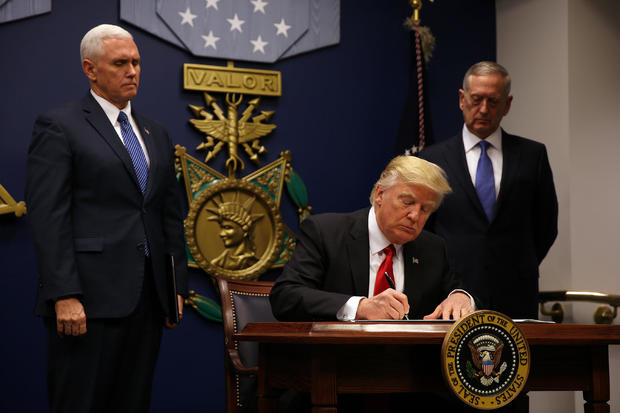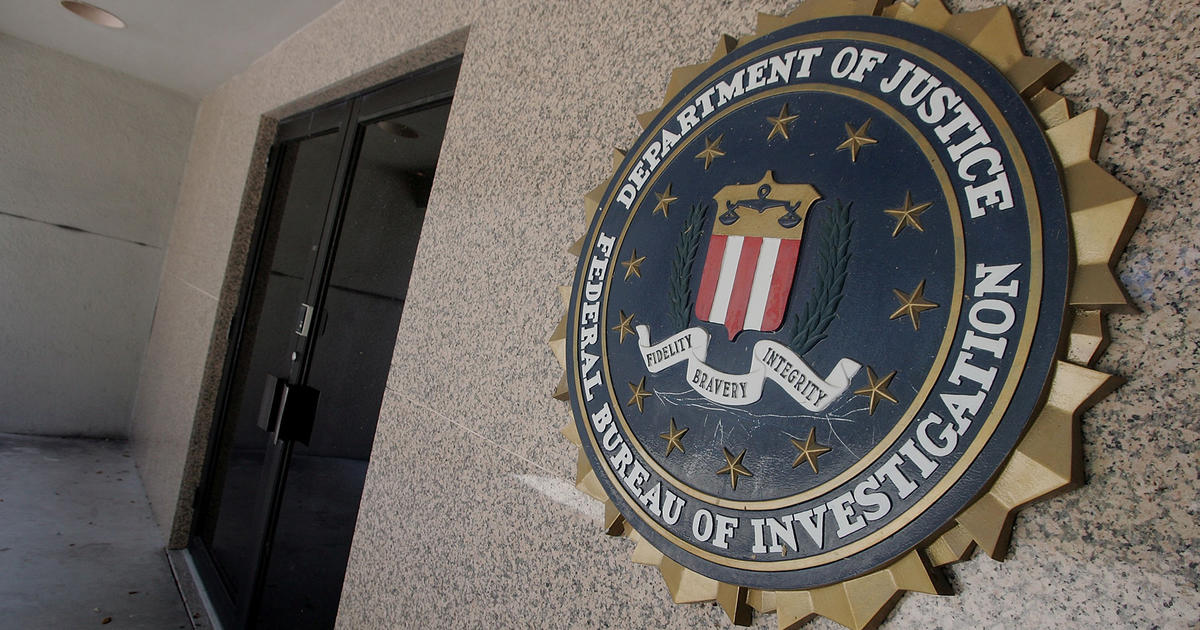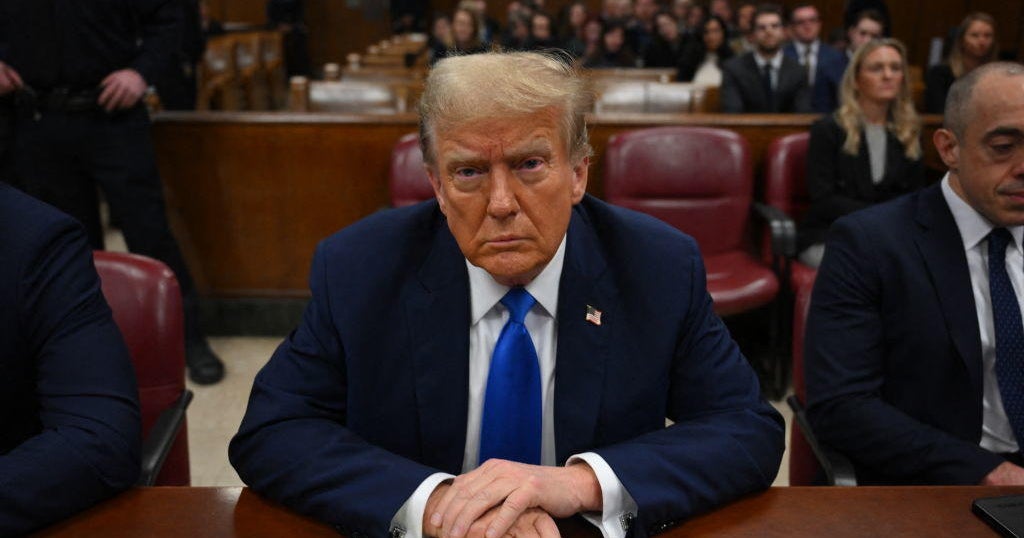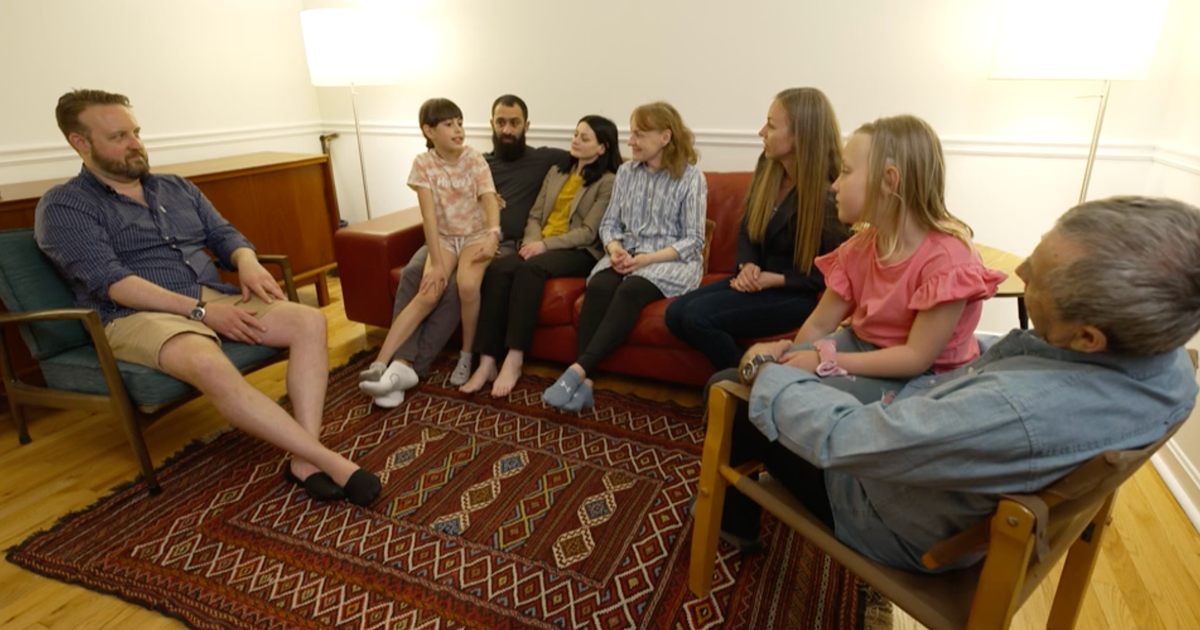Trump signs executive actions on "extreme vetting," rebuilding military
At the Pentagon for a swearing-in ceremony for Defense Secretary Ret. Gen. James Mattis, Donald Trump signed two executive actions -- one on rebuilding the military and one making major changes to America’s policies on refugees and immigration.
“I’m establishing new vetting measures to keep radical Islamic terrorists out of the United States,” the president told an audience at the Pentagon Friday.
Hours later the White House released details of the executive order titled “Protecting The Nation From Foreign Terrorist Entry Into The United States.” It indefinitely suspends the United States’ Syrian refugees program, which Trump had vowed to do on the campaign trail.
It says “the entry of nationals of Syria as refugees is detrimental to the interests of the United States” and suspends “any such entry” until the president has determined that “sufficient changes have been made to the USRAP [U.S. Refugee Admissions Program] to ensure that admission of Syrian refugees is consistent with the national interest.”
Trump’s order directs the State Department to stop issuing visas to Syrian nationals and halts the processing of Syrian refugees. That will remain in effect until Trump determines that enough security changes have been made to ensure that would-be terrorists can’t exploit weaknesses in the current vetting system.
The president, during his signing of the order at the Department of Homeland Security, also called on the Pentagon and the State Department to create a plan for safe zones in and around Syria to offer protection for Syrians fleeing the war there.
But the signed order itself makes no mention of a plan for safe zones in Syria. A draft of the order had directed the Pentagon and the State Department to produce a plan for safe zones in the war-torn Mideast nation.
Several other points included in the action:
Trump ordered a 120-day suspension of the U.S. Refugee Admissions Program, which is America’s broader refugee program. The suspension is intended to provide time to review how refugees are vetted before they are allowed to resettle in the United States.
The executive action appears to be capping the number of refugees from other countries at 50,000 people in in fiscal year 2017, saying more than that “would be detrimental to the interests of the United States.”
The action says that when U.S. Refugee Admissions Program admissions resume, the Secretary of State in consultation with the Secretary of Homeland Security is directed to make changes, to the extent permitted by law, “to prioritize refugee claims made by individuals on the basis of religious-based persecution, provided that the religion of the individual is a minority religion in the individual’s country of nationality.”
Trump’s order did not spell out specifically what additional steps he wants to see the Homeland Security and State departments to add to the country’s vetting system for refugees. Instead he directed officials to the review the refugee application and approval process to find any other security measures that can be added to prevent people who pose a threat from using the refugee program.
Trump’s executive order suspends all immigration from countries with terrorism concerns for 90 days. It was unclear from the law cited in the order which countries would be affected, though a draft of the order pointed to a legal provision that identified Iran, Iraq, Libya, Somalia, Sudan, Syria and Yemen, all majority-Muslim countries, for at least 30 days. The order also calls for Homeland Security and State Department officials, along with the director of national intelligence, to review what information the government needs to fully vet would-be visitors and come up with a list of countries that don’t provide it. The order says the government will give countries 60 days to start providing the information or citizens from those countries will be barred from traveling to the United States.
In a portion of an interview released Friday, Mr. Trump seemed to suggest that one group of refugees could look forward to some relief. He told the Christain Broadcasting Network that Christians in Syria find it “almost impossible to get into the United States.”
“The reason that was so unfair, everybody was persecuted in all fairness, but they were chopping off the heads of everybody -- but more so the Christians,” Mr. Trump said. “And I thought it was very, very unfair. So we are going to help them.”
Christians comprise about 10 percent of the Syrian population, according to the CIA World Fact Book.
Before the details of the action came to light, uncertainty surrounding President Trump’s plans to ban immigrants from certain countries from entering the U.S. caused stress among some already.
Nuha Alsakkaff, 26, fled her war-torn country of Yemen more than six years ago. Alsakkaff is now a U.S citizen and is trying to get the rest of her family here, too. But if immigrants from Yemen are banned, she says she’ll be devastated.
“I can’t save my people. I can’t save my family,” she told CBS News.
Mr. Trump also signed another executive action promising “a great rebuilding of the armed services of the United States.” There would be, Mr. Trump promised, new planes, new ships, resources and tools for the nation’s men and women in uniform.
“As we prepare our budget request for Congress,” he said, “...our military strength will be questioned by no one,” but neither will the nation’s commitment to peace. “We will always have your back,” he vowed.
The president signed the actions following a ceremony for the swearing-in of Defense Secretary James Mattis, who he said, is “going to lead us so brilliantly.”
Mr. Trump campaigned on a proposal to put in place “extreme vetting” particularly for people coming to the U.S. from countries with terrorism ties.
“I would not allow people to come in from terrorist nations. I would do extreme vetting,” he said in July.





